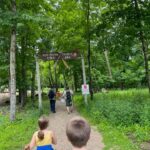Hiking & Leave No Trace
The main lesson we impart on the Scouts on hikes is the importance of six essentials of preparation.
The six essentials of hiking in Cub Scouts are a set of items that every scout should carry to ensure safety and preparedness while on a hike. These essentials help scouts handle various situations they might encounter on the trail. Here are the six essentials:
-
First Aid Kit:
- A basic first aid kit includes bandages, antiseptic wipes, gauze, adhesive tape, and any personal medications. It ensures scouts can treat minor injuries and manage medical needs until help is available.
-
Filled Water Bottle:
- Staying hydrated is crucial during any hike. Scouts should carry enough water to last the duration of the hike, typically a minimum of one liter, and know where to find refills if needed.
-
Flashlight:
- A flashlight with extra batteries helps scouts navigate in low-light conditions or if they get caught on the trail after dark. It’s also useful for signaling in an emergency.
-
Trail Food:
- Nutritious snacks like granola bars, nuts, dried fruit, or trail mix provide energy and keep scouts fueled during their hike. It’s important to carry enough food to sustain energy levels.
-
Sun Protection:
- Sunscreen, a hat, and sunglasses protect against sunburn and harmful UV rays. Scouts should apply sunscreen before the hike and reapply as needed, especially if they are sweating or swimming.
-
Whistle:
- A whistle can be used to signal for help if a scout gets lost or encounters an emergency. The sound of a whistle carries farther than a shout, making it easier for rescuers to locate the scout.
These essentials are designed to promote safety and self-reliance while hiking, helping scouts to be prepared for unexpected situations and to enjoy their outdoor adventures responsibly.
Leave No Trace
Cub Scouts learn about the Leave No Trace principles, which are a set of guidelines for minimizing their impact on the environment while enjoying outdoor activities. These principles teach scouts how to be responsible and respectful stewards of nature. Here are the key aspects they learn:
Plan Ahead and Prepare:
- Researching and understanding the area they will visit, including regulations and weather conditions.
- Preparing for their activities by packing appropriately and ensuring they have the necessary supplies to minimize their impact.
-
Travel and Camp on Durable Surfaces:
- Staying on established trails and camping in designated areas to avoid damaging fragile ecosystems.
- Avoiding shortcuts and spreading out in pristine areas to prevent creating new trails.
-
Dispose of Waste Properly:
- Packing out all trash, leftover food, and litter to leave the area cleaner than they found it.
- Using restroom facilities when available or practicing proper methods for disposing of human waste.
-
Leave What You Find:
- Preserving the natural environment by not picking plants, disturbing wildlife, or taking natural objects as souvenirs.
- Leaving historical and cultural artifacts undisturbed for others to enjoy.
-
Minimize Campfire Impact:
- Using established fire rings, fire pans, or portable stoves to reduce the impact of campfires.
- Keeping fires small and burning only small sticks that can be broken by hand, and ensuring fires are completely extinguished before leaving.
-
Respect Wildlife:
- Observing animals from a distance and not feeding them, which can disrupt their natural behaviors and harm their health.
- Storing food securely to prevent wildlife from accessing it and becoming habituated to humans.
-
Be Considerate of Other Visitors:
- Being courteous and respectful to other outdoor enthusiasts by keeping noise levels down and yielding to others on the trail.
- Maintaining a friendly and cooperative attitude to ensure everyone can enjoy the natural environment.
By learning and practicing the Leave No Trace principles, Cub Scouts develop a deep respect for nature and gain the skills and knowledge needed to minimize their environmental footprint while enjoying outdoor activities. These principles help foster a lifelong commitment to environmental stewardship and responsible outdoor recreation.



